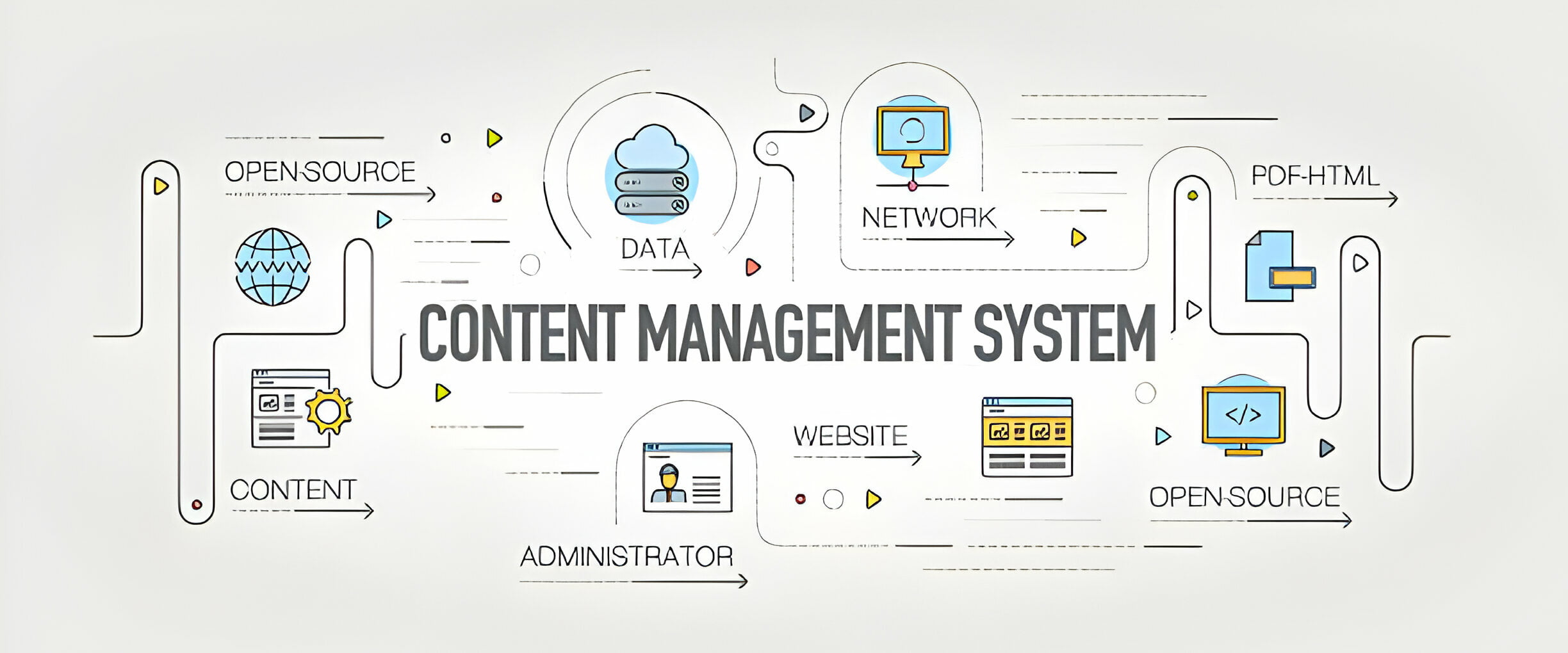
Having a website is no longer a luxury, it's a necessity. Businesses of all sizes leverage websites to connect with customers, showcase their products and services, and establish themselves as trusted authorities. But for many, the thought of building and maintaining a website can be daunting.
This is where Content Management Systems (CMS) come in. CMS platforms are user-friendly software applications that empower anyone, regardless of technical background, to create, edit, and publish website content.
Think of a CMS as a familiar word processor you use for everyday writing tasks. But instead of documents, you're crafting the building blocks of your online presence, like product descriptions, blog posts, and landing pages.
Here's a breakdown of how CMS web development simplifies website creation and management:
Most CMS platforms offer a range of user-friendly features. You'll find rich text editors that allow you to format your content just like in a word processing program, with options for bolding, italicizing, and adding bullet points. Additionally, you'll have access to media libraries for storing images and videos, and user management tools to control who can access and edit your website content.
This is the user interface where you create and manage all your website content. It visually represents your website's structure, so you can see exactly how your changes will appear before publishing them live. Imagine the CMA as your website's control center, where you can add new pages, edit existing content, and organize everything for a seamless user experience.
Think of the CDA as the engine behind the scenes that takes all the amazing content you create in the CMA and displays it beautifully on your live website. It's the invisible force that makes your website come alive for visitors.
In essence, a CMS acts as a bridge between you and the technical complexities of website management. It allows you to focus on creating compelling content and leave the technical aspects to the system.

Why Choose a CMS? A Multitude of Benefits
There are numerous reasons why businesses and individuals are singing the praises of CMS for website management. Let's explore the key advantages:
With a CMS, you can create, edit, and publish content quickly and easily, saving valuable time and resources that you can dedicate to other aspects of your business.
No coding experience? No problem! CMS platforms are designed with user-friendliness in mind. Even those without technical skills can create professional-looking websites that showcase their brand and attract visitors.
As your business flourishes and your website evolves, a CMS web design allows you to seamlessly add new pages, sections, and functionalities. It adapts to your growing needs without requiring a complete website overhaul.
Many CMS platforms offer multi-user capabilities. This means your team can work together on website content, fostering efficient communication and streamlined workflows. Imagine multiple team members creating blog posts, updating product descriptions, and managing website content simultaneously.
Security is paramount in today's digital world. Thankfully, CMS platforms prioritize robust security measures to protect your website from malicious attacks and data breaches. Built-in features and regular updates ensure your website remains a haven for your visitors and your data.
However, the benefits of CMS website development extend beyond these core advantages.

Here's How a CMS Can Help You Achieve Specific Goals
Search Engine Optimization (SEO) is optimizing your website content to rank higher in search engine results. Many CMS platforms offer built-in SEO tools or integrate with SEO plugins. This allows you to optimize your website content for search engines, attracting more organic traffic and boosting your online visibility.
Maintaining a consistent brand image across your website is crucial for establishing trust and recognition. A CMS allows you to create templates and style guides, ensuring all your content adheres to your brand's unique voice and visual identity.
Some CMS platforms offer analytics tools that provide valuable insights into website traffic and user behavior. This data empowers you to understand your audience better and tailor your content to resonate with them, ultimately maximizing the impact of your website.
Selecting the Perfect Platform: Navigating the CMS Landscape
With a plethora of CMS options available, choosing the right one for your needs can feel overwhelming. But fret not! Here's a roadmap to guide you through the selection process:
Before diving in, take a step back and consider your website's purpose, target audience, and desired functionalities. Are you looking for a simple blog platform to share your passion for baking? Do you need a robust e-commerce store to sell your handmade crafts? Maybe you envision a membership website to deliver exclusive content to your subscribers. Understanding your website's goals will help you narrow down the CMS options that best suit your requirements.
The world of CMS is teeming with various platforms, each with its strengths and weaknesses. Here's a glimpse into some of the most widely used and well-regarded options that offer website development services:
- WordPress: This free, open-source platform reigns supreme in terms of user-friendliness and its vast plugin ecosystem. It's a perfect choice for beginners, bloggers, and small business websites offering basic e-commerce functionalities.
- Shopify: If your primary focus is online sales, then Shopify is your champion. This powerful, all-in-one e-commerce platform offers a comprehensive suite of features to manage your products, payments, marketing, and more.
- Wix: For those seeking a user-friendly, drag-and-drop website builder with pre-designed templates, Wix is a strong contender. It's ideal for creating simple websites and caters well to beginners with no coding experience.
- Drupal: This robust, open-source platform is a favorite for complex websites with extensive customization needs. Drupal boasts ultimate flexibility but comes with a steeper learning curve compared to other options.
Now that you have a better understanding of your needs and some popular platforms, it's time to assess your options critically. Here are some key factors to consider:
Can you navigate the platform intuitively? Is creating and managing content straightforward, or does it require technical knowledge? Prioritize user-friendliness, especially if you're a beginner.
Does the platform offer the functionalities you need to achieve your website goals? Consider essential features like e-commerce capabilities, SEO tools, multimedia management, and social media integration.
Think about the future! Will the platform be able to accommodate your website's growth as your business expands? Choose a CMS that scales seamlessly with your needs.
CMS platforms come with varying pricing structures. Some are free and open-source, while others require monthly subscriptions or one-time fees. Consider your budget and choose a platform that aligns with your financial resources.
Website security is paramount. Ensure the CMS platform prioritizes robust security measures to protect your website from malicious attacks and data breaches.
If you're feeling overwhelmed by the selection process, don't hesitate to seek help from a web developer or digital marketing agency. These professionals can assess your needs and recommend the most suitable CMS platform for your website.

The Full Potential of Your CMS: Beyond the Basics
Once you've chosen your champion CMS platform and familiarized yourself with its functionalities, it's time to unleash its full potential and elevate your website to new heights. Here are some additional considerations:
Many CMS platforms offer a library of themes, which are pre-designed layouts that define the visual appearance of your website. Think of them as website templates you can customize to match your brand identity and create a unique user experience. Most platforms allow for customization options such as color schemes, font styles, and logo uploads.
Imagine plugins and extensions as superpowers for your CMS. They offer additional functionalities that can significantly enhance your website's capabilities. Explore app marketplaces to discover tools for SEO optimization, social media integration, form creation, analytics tracking, and much more.
Your CMS is a powerful tool for content marketing. Regularly publish high-quality blog posts, articles, infographics, and videos to attract visitors, establish yourself as an authority in your field, and ultimately drive conversions. Conversions can refer to various goals, such as encouraging visitors to sign up for your email list, make a purchase, or download a resource.
Optimize your website content and structure for search engines to improve organic traffic and website visibility. Utilize built-in SEO tools or integrate with SEO plugins to help your website rank higher in search results.
By embracing these strategies, you can transform your CMS from a simple content management tool into a powerful platform for achieving your online goals. With a user-friendly CMS, a strategic approach, and high-quality content, you can conquer the digital world and establish a thriving online presence.
Maintaining and Refining Your Website for Long-Term Success
Creating a website is just the first step. To maintain its effectiveness and keep your audience engaged, here are some ongoing website maintenance practices to consider:
Fresh and informative content is essential for captivating your target audience and keeping them coming back for more. Regularly publish new blog posts, articles, product descriptions, or other relevant content to showcase your expertise and provide value to your visitors.
In today's digital landscape, security is paramount. Always apply the latest security updates and patches provided by your CMS platform to address vulnerabilities and protect your website from potential threats. Additionally, implement regular website backups to ensure you have a recent copy of your website's data in case of unforeseen circumstances.
Website speed is crucial for user experience. Run regular website speed tests and implement strategies to optimize page loading times. Consider factors like image size compression and caching mechanisms to ensure your website loads quickly and delivers a smooth browsing experience for your visitors.
Leverage the built-in analytics tools offered by your CMS or integrate with analytics platforms like Google Analytics. By monitoring website traffic, user behavior, and key performance indicators (KPIs), you can gain valuable insights into how visitors interact with your website. Use this data to make informed decisions about content strategy, website design, and overall optimization to enhance user experience and achieve your website's goals.
The world has gone mobile! Ensure your website is responsive and adapts seamlessly to different screen sizes and devices. A mobile-friendly website provides an optimal user experience for visitors browsing on smartphones, tablets, and laptops, increasing engagement and conversions.
Social media is a powerful tool for connecting with your audience and promoting your website. Integrate social media sharing buttons on your website to encourage visitors to share your content on their networks. Additionally, consider incorporating social media feeds or live chat functionalities to foster interaction and build a strong online community.
Conclusion
By leveraging the power of a CMS platform and following these practical strategies, you can establish a successful website that fulfills your goals. Remember, your website is a dynamic entity that requires ongoing maintenance and adaptation. Embrace new technologies, stay updated on the latest trends, and prioritize user experience to ensure your website thrives in the ever-evolving digital landscape.
Read More: Website Development Services



1 comment on “Why Your Website Needs a Content Management System”